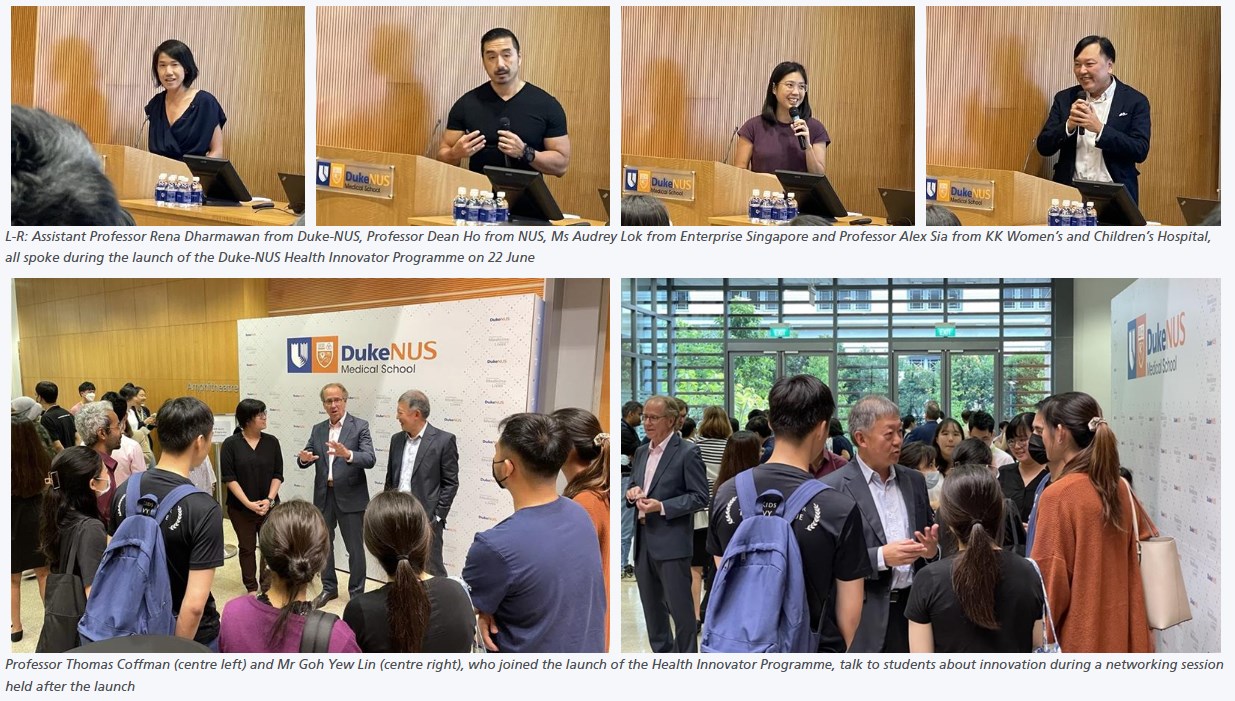Professor Scott Compton, Associate Dean for Medical Education, moderated a panel of Health Innovator Programme fellows, who shared why they applied for the programme, what they had learnt and what some of the biggest challenges were so far
Singapore’s status as a thriving global innovation node received a boost with the launch of a new programme that will spark an innovation-driven mindset in the next generation of clinicians, engineers and entrepreneurs.
“The Health Innovator Programme represents a fantastic opportunity for third-year Duke-NUS students who are interested in innovation and entrepreneurship,” said Professor Thomas Coffman, Dean of Duke-NUS, during a pre-recorded message at the launch of the programme.
Underlining the School’s commitment to innovation, Prof Coffman added that this programme will help “bring discoveries from the imaginations of scientists and inventors into the public domain where they can improve lives.” Discoveries that he hopes will stand alongside innovations such as cPassTM, the first clinically approved surrogate virus neuralisation test, and exciting therapies and potential cures for diseases such as fibrosis and cancer that are being developed by scientists at Duke-NUS.
Held at the Amphitheatre at Duke-NUS on 22 September, the launch—like the programme—brought together stakeholders from the innovation ecosystem, including innovation champions like Professor Dean Ho from NUS, representatives from industry such as Enterprise Singapore and startups like Vivo Surgical as well as clinician mentors from the SingHealth Group.
Sharing his reflections during the launch, Professor Alex Sia, CEO of KK Women’s and Children’s Hospital, the main clinical partner institution for this women’s health-themed edition of the programme, highlighted the opportunity at hand.
“We now have a unique opportunity to set something up that will be able to impact the medtech scene in general in Singapore,” said Prof Sia, adding that the programme will provide a springboard to link up with other areas and sectors to solve bigger challenges ahead.
Speaking during a panel discussion at the launch, four students from the inaugural cohort talked about their projects, what had prompted them to apply for this programme, their experience so far and the challenges they have faced.
The students talked about the clinical needs their teams are exploring, which range from in-vitro fertilization to fibroid surgery and prenatal ultrasound technology. With the guidance of their industry partners and clinical mentors, they will go on to invent solutions and develop prototypes before presenting their projects at a Shark Tank-style presentation at the end.
“In the coming years, we’ll actually be scaling this programme further and we’d like the support of everyone here on our journey as we become the flagship innovation programme for all medical students here in Singapore,” said Assistant Dean and Professor for Clinical Innovation and Ecosystem Development Rena Dharmawan, who developed the programme.

